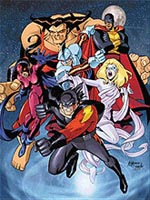>> Comment: Appointments With Disappointment
>> Comment: Accentuate The Positive?
More...

Stanley Lieber, aka Stan "The Man" Lee, has always seemed the unflagging voice of comics. His numerous movie cameos, his never-bettered showboating PR style and his creation of almost the entire Marvel Universe (with a little help from his friends) has allowed him to come off as the untouchably altruistic crazy uncle of the comics industry. Which is why his split from long-time employer Marvel and the creation of his own e-comics business seemed such an interesting proposal.
Stan Lee Media was monolithic in the great way of so many huge dot-coms. "The business model was, and I think still is, sound," explains David Medinnus, the chief technical officer at SLM; "To create entertainment properties which can be licensed in a bunch of different venues; apparel, toys, movies, cartoons, TV, comics, books, etc."
 But it wasn't the company's goals that were the problem. "We all had nagging questions about exactly how the company intended to make money," says Buzz Dixon, a writer of the 'webisodes' the site published. "A big hunk of the original plan hinged on selling subscriptions to users, and as we all know, it's very difficult to get people to pay for anything on the Internet past their initial server."
But it wasn't the company's goals that were the problem. "We all had nagging questions about exactly how the company intended to make money," says Buzz Dixon, a writer of the 'webisodes' the site published. "A big hunk of the original plan hinged on selling subscriptions to users, and as we all know, it's very difficult to get people to pay for anything on the Internet past their initial server."
Whether the work the site produced could have been able to support the company proved irrelevant in the end, however, when trading in the company was suspended and criminal charges were levelled against SLM's most important employee after Lee.
Co-founder Peter Paul had a criminal record even before he started work for the company. His involvement in a bid to scam the Cuban Government out of $8.7 million and his conviction for cocaine possession cast a questionable light on his reliability. Then last year he was indicted on charges of securities fraud and conspiracy to commit securities fraud at SLM, where he served as a consultant. "Stan trusted Peter, which proved to be a disastrous mistake," notes Medinnus.
Andrew Baker, the head writer for SLM, goes further; "He had convinced Stan that he was a brilliant businessman - and, if you define being a good businessman as someone who can con people into investing money, I suppose he was."
His flaws seemingly weren't limited to his dubious approach to business. "Nepotism from Peter Paul was rampant," Medinnus suggests. He claims that the company "was forced to hire [Paul's] son at an inflated rate, without his son having any real ability. His wife was made corporate treasurer, etc. ... I spent months trying to correct the worst of these practices, appealing to Stan himself." But to no avail.
Baker calls Paul "an intimidator, a yeller and a screamer," noting, "He promoted his own projects - he was supposedly a co-creator of THE 7TH PORTAL - while scuttling dozens of others. ... You would be hard pressed to find anyone at SLM who liked Mr. Paul, few who respected him, and only one - Steven Gordon - who had any idea what Mr. Paul was doing to bring down the company while making a tidy profit." Gordon was later accused of embezzlement alongside Paul.
 Even aside from the activities and reputation of Peter Paul, SLM also had a problem when it came to product. A number of well-known writers and artists from the comics industry and further afield were hired to create the 'webisodes' SLM intended to sell. Artists such as John Fox, Ruben Martinez and Russ Heath worked alongside writers such as Mark Evanier, Mike Barr, Marv Wolfman and Steve Gerber.
Even aside from the activities and reputation of Peter Paul, SLM also had a problem when it came to product. A number of well-known writers and artists from the comics industry and further afield were hired to create the 'webisodes' SLM intended to sell. Artists such as John Fox, Ruben Martinez and Russ Heath worked alongside writers such as Mark Evanier, Mike Barr, Marv Wolfman and Steve Gerber.
"It was Buzz Dixon, with whom I'd worked on various animation projects over the years, who first invited me to get involved as a freelancer," explains Gerber, creator of HOWARD THE DUCK. "Stan, of course, was also interested in my working with the company, once he learned I was available."
With his recent work for long-time rivals DC Comics, Lee's ability as a writer has been drawn into question. His iconoclastic hyperbole may have seemed like a breath of fresh air in the sixties, but it reads as unsubtle and camp to a modern audience. However, despite his flaws, it's his editorial knack that always shined through. "When he got excited, as he often did during a story meeting, he could nail a line or a scene," Baker said. "He was also an astute reader - he gave great notes on outlines when he had time to devote to them."
But problems arose when Lee would introduce his own ideas. A perfect example is SLM's reinvention of the MIGHTY MOUSE character for a modern age. The set-up - the new hero would be the original's grandson, and gain his powers from his grandfather's cape - proved unworkable for the writing team. "Ultimately, with a deadline looming, Stan turned the storyboarding duties over to Ruben Martinez, perhaps the best artist SLM had on staff.
"Ruben shaped a story based on a discussion with Stan, then turned over the boards to Stan, who added dialogue." The end product was unusable, and the rights holders cancelled the project once they saw the work. "I don't mind saying that that is a really bad way to write a script. I don't care how well it might have worked for Stan and Jack Kirby," says Baker.
With the endless hype seemingly never heralding any actual product, and subscriptions drastically below what was predicted, SLM struggled into other areas to keep itself afloat. "When it was clear that the online model wasn't going to make any money, we tried to become an 'Idea House', a place to develop concepts for traditional media," says Baker. They even began handling third-party products based on such starkly different projects as the WWF, the TV show COPS and Anna Kournikova.
 But it was to no avail; allegations of stock manipulation by Paul and Gordon came to the surface, and the company's capital dried up. "I can't say if it was a scam from day one and always intended by Peter Paul to be an elaborate con," claims Dixon, "or if Peter got sucked in over his head and just decided to loot the company before it slowly spiralled into the ground." With Nasdaq halting trading of SLM stocks and the SEC investigating insider trading, the stockholders decided that enough was enough and filed a class action lawsuit against the company.
But it was to no avail; allegations of stock manipulation by Paul and Gordon came to the surface, and the company's capital dried up. "I can't say if it was a scam from day one and always intended by Peter Paul to be an elaborate con," claims Dixon, "or if Peter got sucked in over his head and just decided to loot the company before it slowly spiralled into the ground." With Nasdaq halting trading of SLM stocks and the SEC investigating insider trading, the stockholders decided that enough was enough and filed a class action lawsuit against the company.
Further investigation revealed that Paul - in his official capacity as SLM's co-founder - had apparently contributed $2 million to Hilary Clinton's Senate campaign fund. The event he produced with this money, 'A Hollywood tribute to Bill Clinton' was packed to the rafters with movie stars willing to support Mr and Mrs Clinton. Paul claims this effort was intended to coax Mr Clinton onto the board of SLM, and had the support of Chelsea Clinton. It has also been suggested that Mr Clinton wanted the money to come from SLM rather than Paul himself, to avoid directly connecting himself with a known felon.
Nothing Paul did was ever truly altruistic. He alleged that, in exchange for his support for the party, then chairman of the Democratic Party Ed Rendell had promised to arrange a pardon for $150,000. When he didn't get his pardon, he took the matter to the courts. "Did you see him on 60 Minutes?" asks Baker. "The reporters were flabbergasted; 'You're suing because your bribe didn't work?'"
After securing bail, Paul escaped prosecution by escaping to his home in Brazil, forcing the US Attorney's Office to seek extradition. By this stage, the dream of Stan Lee Media was truly dead.
"It wasn't the concept of online entertainment that failed, it was the scale of these projects," says Joey Manley, president of webcomics company Modern Tales. "Running an entertainment business on the web is no more glamorous than running an automobile repair shop."
Baker agrees; "SLM should have been a successful company, but it was inefficient and bloated." Very few of the employees remember the company's history with anything but sadness. Says Gerber; "It's a long, involved, and very depressing story."
But in all the noise and fury of litigation, were the comics themselves somehow forgotten? Not by everybody. "He had one animated story where we see this character sits at his desk and turn on his computer then 'Zap!' You see what he's looking at, right on your computer screen," remembers Bill Jemas, president of Marvel Comics.
"There was one that had the basic premise of DIGIMON; people obtain super powers by falling into their computer & entering cyberspace," says Manley "I think the best one was actually the BACKSTREET BOYS crossover. Or was it 'N SYNC?"

This article is Ideological Freeware. The author grants permission for its reproduction and redistribution by private individuals on condition that the author and source of the article are clearly shown, no charge is made, and the whole article is reproduced intact, including this notice.


